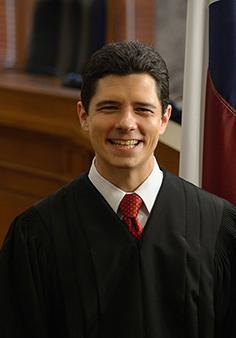Politics Not Supreme at the High Court
Texas Court of Appeals Judge Brett Busby '98 Shares Lessons in Judicial Decision Making.
New York, September 30, 2013—Judicial discretion is not nearly as broad or political as it is portrayed in popular media—even at the nation’s highest court, said Brett Busby ’98, who discussed lessons he learned from two U.S. Supreme Court clerkships at a Sept. 19 lecture at Columbia Law School.
| Justice Brett Busby '98 |
Judges are limited by a number of factors, including the U.S. and state constitutions, statutes, precedent and methodology, the hierarchical court system, and other government branches, said Busby, a judge for the Fourteenth Court of Appeals in Texas who clerked for Byron R. White and John Paul Stevens. Busby’s lecture was the first event in the Third Annual Madison Lecture Series on Judicial Engagement, sponsored by the Federalist Society.
Judges also emphasize different values in their decision-making, which can lead to unexpected groupings in majority and dissenting opinions.
For example, Bullcoming v. New Mexico, a case decided in June 2011, centered on whether a defendant had the right to question a laboratory analyst who ran routine lab tests. The justices decided in a 5-4 decision that a surrogate analyst could not testify in place of the original analyst.
The majority included a surprising mix of liberal and conservative justices—Antonin Scalia, Clarence Thomas, Ruth Bader Ginsburg, Elena Kagan, and Sonia Sotomayor—who Busby explained all believed idealistically in perfect adherence to the confrontation clause in the Constitution’s 6th amendment.
The dissenting justices—Chief John G. Roberts, Jr., Anthony M. Kennedy, Stephen G. Breyer, and Samuel A. Alito Jr.—believed instead that the decision should have been guided by practical considerations about how our legal system functions.
Busby said the experience of clerking at the U.S. Supreme Court informed his private practice, teaching and judicial careers. He advised students to research the judges who oversee their future cases.
